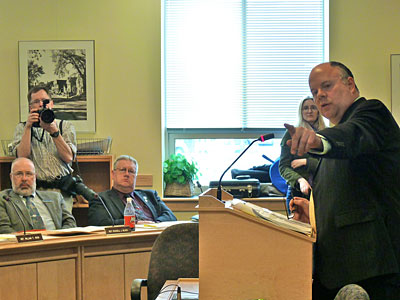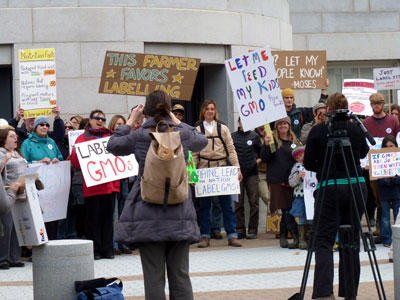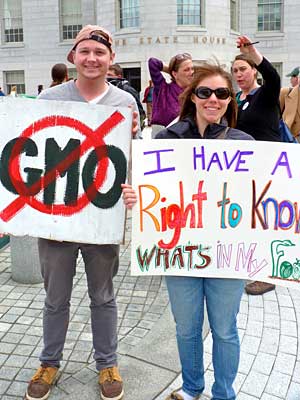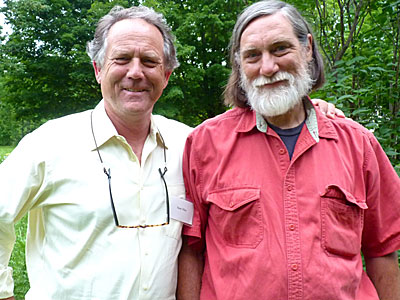 |
| Lance Harvell testifying before the Joint Standing Committee on Agriculture, Conservation and Forestry. Photos by Jean English. |
Governor promises he’ll sign in January
Two hundred people rallying under Maine Governor Paul LePage’s windows at the State House; 91 percent of Maine people polled saying they want labeling; Rep. Lance Harvell working the halls of the Legislature endlessly, rallying unprecedented support; Jim Gerritsen driving repeatedly from his Aroostook County farm to Augusta: Maine had an exciting and comprehensive campaign this year to label genetically engineered (GE) foods, a campaign driven by several committed groups and individuals.
(The term GMO – genetically modified organism – is sometimes used for GE foods.)
In June, Connecticut became the first state to enact a GE labeling law, while the Maine House and Senate overwhelmingly approved a labeling bill and the Vermont House passed a similar bill, which will head to the Vermont Senate in January 2014.
On June 11, the Maine House of Representatives voted 141-4 to support LD 718, “An Act To Protect Maine Food Consumers’ Right To Know about Genetically Engineered Food,” which would require that products made with GE ingredients be labeled “Produced with Genetic Engineering.” The bill, which would take effect after four other contiguous states pass similar laws, also prohibits retailers from labeling a product as “natural” if it is made with GE ingredients.
 |
| About 200 people rallied outside the Maine State House before the GE labeling hearing. |
 |
| Ten-year-old Amy Gerritsen testified that labeling is the honest thing for companies to do. |
On June 12, the Maine Senate voted 35-0 for the labeling bill.
Maine’s bill will sit on Gov. LePage’s desk until January, when he has promised to sign it. He delayed signing in anticipation that the agricultural biotech industry might sue another state that passes a bill before Maine, possibly saving legal fees for Maine. The Governor’s letter to this effect is posted at https://www.mofga.org/LinkClick.aspx?fileticket=x5Ty5Ld6BU0%3d&tabid=74.
Rep. Lance Harvell, R-Farmington, the primary sponsor of the bill, had 123 co-sponsors. Sen. Christopher Johnson, D-Somerville, was lead co-sponsor. Harvell, described by MOFGA certified organic farmer Jim Gerritsen of Wood Prairie Farm as “the well-read Tea Party Republican, paper mill worker, organic gardener and horse logger,” gave an especially rousing floor speech, posted at www.youtube.com/watch?v=g4vMvpqd-Ec.
Many called LD 718 the most talked about piece of Maine legislation this year. Much of its success was due to the tremendous efforts of Gerritsen and of MOFGA board member Sam May and the work they inspired at all levels, from grassroots to legislative leadership. More than 200 people attended a rally in Augusta to support Maine’s bill, and almost 100 signed up to testify in support of LD 718, seeking the same rights that more than half the world’s people, in 62 other countries, have.
Also involved were the law firm PretiFlaherty, notably attorneys Severin Beliveau and Daniel Walker, lead lobbyists for the campaign; lobbyist, attorney and campaign coordinator Logan Perkins; organizer Jessie Dowling; several MOFGA staff members; and hundreds of MOFGA members and friends. (See coverage in the June-August 2013 issue of The MOF&G.)
The Maine Conservation Voters – especially Beth Ahearn, Maureen Drouin and Gianna Short – played a crucial role, too. “Maureen and Beth recognized instantly that this was so important, and they lined up right behind us from the start,” says MOFGA’s interim executive director Heather Spalding. “Beth Ahearn has been such a help to MOFGA and its legislative priorities for the past three years. She is phenomenal and has such great perspective. I have been thrilled that Maine Conservation Voters stepped up to support this bill so willingly.”
And Michael Hansen of Consumers Union, an expert on GE foods, traveled to Maine twice to help our effort, testifying about the lack of independent safety testing of GE foods.
MOFGA also worked closely with attorney Peter Drum of Damariscotta to revamp language from the Alliance for Natural Heath’s model bill into Maine’s LD 718.
To secure Gov. LePage’s support, the bill was amended in the House to take effect when similar bills pass in at least four other contiguous states. So Maine’s law cannot go into effect until New Hampshire passes a similar law. Rep. Brian Jones, D-Freedom, objected that the contiguous state mandate “effectively gives New Hampshire veto power.”
 |
| Unity College students Quinn Boyle and Marina Theberge want to know what’s in their food. |
A labeling bill, H.B. 660, was submitted to the N.H. legislature this spring; it will be in committee work sessions this summer and must be reported out of committee by Nov. 22. MOFGA is working with our N.H. friends to help move this bill forward.
The Connecticut bill will not go into effect until four other states, at least one bordering Connecticut, and with a combined population of at least 20 million, pass similar regulations.
Opponents of Maine’s legislation – the biotech industry (represented in Maine by lobbyist Robert Tardy), Maine State Chamber of Commerce, Maine Farm Bureau and the Grocery Manufacturers Association – said the bill would imply that GE foods are unsafe. These bodies claim that GE foods have no adverse health effects and note that manufacturers can already label their products voluntarily as GE-free.
Supporters countered that the federal government lets the biotech industry do the safety studies used to regulate its products, and almost no independent, long-term testing of GE foods exists.
Sen. Thomas Saviello, R-Wilton, supported LD 718 partly to honor MOFGA’s late executive director, Russell Libby. “I know he wants this bill, which is why I’m voting for it,” Saviello was quoted in the Bangor Daily News. “He’s now farming the great organic garden in the sky.”
Maine’s labeling bill was almost co-opted after the public comment period, when representatives of the infant formula industry tried to have it amended to exempt its products – something the infant formula industry tried in California and Vermont, as well. Attorney Dan Riley, representing Abbott Laboratories, said the soybean oil used in infant formula is processed to the point that it contains no GE DNA. Maine’s Joint Standing Committee on Agriculture, Conservation and Forestry voted against this proposed amendment.
Also in May, U.S. Sen. Bernard Sanders, I-Vt., introduced an unsuccessful amendment to the farm bill to protect states from legal challenges if they required GE labels. Maine Sen. Angus King supported that amendment, while Sen. Susan Collins opposed it.
More than 20 other states are considering labeling laws, and Washington state has a labeling initiative on its fall ballot.
These “Right to Know” campaigns follow California’s 2012 Proposition 37, a GE labeling initiative with huge popular support that showed strong signs of passing until the agricultural biotech industry and its supporters outspent labeling proponents by $46 million to $9.2 million. Despite the massive economic inequity, the measure failed by only 51 to 48 percent.
In the Northwest, concern is high about possible approval of GE salmon and apples, two important industries there. Alaska already requires labeling of GE fish and shellfish.
Also in June, the USDA approved a non-GMO label claim for meat, poultry and liquid eggs from animals fed only non-GE feed, and the Senate Appropriations Committee voted to give the FDA $150,000 to label GE salmon if the agency approves the engineered fish.
(“With Recent Victories, Movement to Label GMOs Gains Steam,” by Helena Bottemiller, Food Safety News, June 27, 2013; https://www.foodsafetynews.com/2013/06/movement-to-label-gmos-gaining-steam/#.UdQg6GSG0wG; “Governor signs GMO label bill,” Fairfield Sun, June 27, 2013; www.fairfield-sun.com/14189/governor-signs-gmo-label-bill/; “Maine House overwhelmingly supports GMO labeling requirement,” by Matthew Stone, Bangor Daily News, June 11, 2013; https://bangordailynews.com/2013/06/11/politics/maine-house-overwhelmingly-supports-gmo-labeling-requirement/; “LePage may OK bill requiring labels for genetically modified foods,” by Steve Mistler, Portland Press Herald, July 9, 2013; https://www.pressherald.com/politics/LePage-may-OK-bill-requiring-labels-for-genetically-modified-foods-.html?pagenum=full; “Senate follows House in strong support of GMO food labeling,” by Christopher Cousins, Bangor Daily News, June 12, 2013; https://bangordailynews.com/2013/06/12/politics/senate-follows-house-in-strong-support-of-gmo-food-labeling/; “Connecticut Approves Labeling Genetically Modified Foods,” by Stephanie Strom, The New York Times, June 3, 2013; www.nytimes.com/2013/06/04/business/connecticut-approves-qualified-genetic-labeling.html?ref=science&_r=1&; “Amendment to Maine GMO Labeling Bill Fails to Win Support,” by Patty B. Wight, MPBN, May 21, 2013; www.mpbn.net/News/MaineNewsArchive/tabid/181/ctl/ViewItem/mid/3475/ItemId/28071/Default.aspx)
 |
| Sam May and Jim Gerritsen |
Volunteer Profiles: Our Not-So Secret Weapons
Jim Gerritsen and Sam May were the dynamic duo of Maine’s GE labeling bill efforts.
Gerritsen, a MOFGA certified organic grower, “brought a national perspective,” says MOFGA’s associate director Chris Hamilton. “Jim understands what’s going on in other states and has connections to national efforts, such as Food Democracy Now!”
A MOFGA member since 1975, before he had even moved to Maine, Gerritsen jumped right into the organization once he arrived in the state. He attended Common Ground Country Fairs in Litchfield and Windsor (and now, Unity), joined an Aroostook County MOFGA chapter in 1976, became a certified organic grower in 1982, and served on MOFGA’s certification committee from about 1985 to 2005, because “I wanted the process to be better.” A few years ago he shifted his focus to MOFGA’s agricultural services committee.
Gerritsen recalls going to an Organic Crop Improvement Association meeting in New Brunswick about 25 years ago, where Pat Roy Mooney of ETC Group, which addresses the impacts of new technologies on communities, spoke about a new technology called genetic engineering. “He got us concerned about biotechnology and the risk of contamination,” says Gerritsen.
Around 1996, Aroostook County became one of the first places to grow a GE crop – the New Leaf potato. After GE potato stock became mixed with non-GE, and some GE spuds were unintentionally sold to McCain Foods for potato process stock, the GE potato industry folded in Aroostook and nationwide – and “some farmers lost their farms” as a result, says Gerritsen, “while Monsanto [which developed and sold New Leaf] dusted its hands off and walked away, leaving a trail of disaster.” (McCain, under consumer pressure, did not want engineered potatoes for its chips.)
Gerritsen later became president of the Organic Seed Alliance, which sued USDA twice over GE Roundup Ready sugar beets and won both times. The organic seed industry “wants to grow good organic seed for the organic community,” says Gerritsen. “Our customers do not want engineered genes in their products. So you fight it or you lose out.”
Gerritsen is now president of the Organic Seed Growers and Trade Association, which has been busy with the OSGATA et al. v. Monsanto lawsuit for the past two years. MOFGA is a plaintiff in that suit.
Regarding Maine’s bill, Gerritsen says that he and his wife, Megan, had breakfast with Russell and Mary Anne Libby on Nov. 11, 2012, the last day of MOFGA’s Farmer to Farmer Conference and “five days after the stolen Nov. 6 Prop 37 election [in California]. Russell [then MOFGA’s executive director] said MOFGA was going forward with a GMO label bill, and it was the top priority for 2013. That was the last day we saw Russell, and that was the first day we got involved in MOFGA’s GMO label bill. We made the commitment to get involved to help fulfill Russell’s wish and to honor his memory. It is absolutely ‘we,’ because every time I was away in Augusta, Megan and the kids had to work that much harder on the farm to make up for my being gone. I think a lot of us on our GMO label team had Russell in our minds as we did our work on his bill.”
Currently only six individual crop types are engineered, says Gerritsen, but USDA is considering 60 or 70 more for commercial approval, including varieties of squash, cabbage and lettuce. “If they’re allowed, it will be hard to find any seed or crop that is not contaminated,” he says.
In addition to his own powerful testimony at Maine’s hearings for GE labeling, and his 10-year-old daughter’s testimony, Gerritsen invited Canadian farmer Stephen Webster to testify. Webster drove 13 hours from his family farm in Ontario to testify about his family’s identity-preserved, non-GE soy that was grown for the Japanese market – until it became contaminated by nearby GE soy, the Japanese would not buy it, and the family lost $15,000. Monsanto tried to blame the Websters for the contamination, according to Webster’s testimony.
“Jim has endless energy and was our main source of information on this issue,” says Hamilton. “It’s amazing how much he has committed his life to this. He was even on the steps of the Connecticut Legislature, cheering everybody on.”
Sam May has been a MOFGA member for several years, has long been interested in food and health, has been going to the Fair off and on since it was in Litchfield, and wanted to volunteer at the Fair but other commitments always interfered. When Gerritsen met him at a Slow Money Maine meeting last fall and asked him to join a group working on the GE labeling campaign, he jumped at the chance. Soon after, Heather Spalding asked May to join the MOFGA board, and he’s been steeped in MOFGA business ever since.
“Sam brought a business perspective to the campaign through his background in banking and investments,” says Hamilton.
May grew up on Maine’s Rockport Harbor in the ‘50s and ‘60s and worked from an early age at Alexander’s Egg Farm and Cripps Dairy in Simonton’s Corner. As a young boy, he helped take the insulated truck to the ice factory to load block ice before delivering the just-bottled milk. By age 13 he was driving from farm to field hauling manure, hay and animals.
May helped his brother Keith start Peter Ott’s Restaurant in Camden in 1974. After college he started Smith and May Masonry with Sam Smith. In 1988 he joined the board of WERU to help grow the station beyond its roots on Blue Hill peninsula. In 1990 he left Maine to earn an MBA in international business and launch a career as a stock analyst and international banker in Silicon Valley and Hong Kong.
Over the last 12 years, May, his family and partners have developed a farm on Maine’s 44-acre Little Spruce Head Island. In his interest in global trends, he has developed an understanding of the critical place of organic food at the heart of health, environment, culture and community.
Regarding the labeling bill, “Jim and I developed a really good rapport early on,” says May. “We’re both determinedly intense. Jim is ferocious, tenacious, intense, fearless, mission-driven. I’m a little more behind the scenes, but persistent.”
The two raised 75 percent of the funds for Maine’s labeling campaign.
As for “a little behind the scenes,” May is well connected with the Legislature and was able to spend time with Senate President Justin Alfond and with House Majority Leader Seth Berry. He was also present at the initial meeting between MOFGA and PretiFlaherty, helping arrange that connection.
“He has tons of energy; he’s there all the time, on every call, always wanting to get together, thinking about stuff,” says Hamilton.
“The beauty of the whole campaign,” says May, “is that we self-selected our roles. We’re all older, mature adults. We covered each other well and developed a high degree of trust.”
Now that the GE campaign has wound down in Maine, May is exploring the feasibility of having MOFGA and Maine Farmland Trust start a statewide credit union.
“MOFGA is a fantastic organization,” says May; “a great resource for the whole state of Maine. A leader.”
LD 718 Right To Know GMO Floor Speech
By Christopher Johnson
An Act to Protect Maine Food Consumers’ Right to Know about Genetically Engineered Food LD 718
Everyone has a right to decide for themselves about the food they buy, and what they feed their families. The impact and long term human safety of genetically engineered food ingredients remain unproven. Yet, for lack of labeling to inform us as consumers, you and I, our children and grandchildren, even our unborn, are laboratory rats in an ill-conceived experiment conducted on a national scale. All people should have the right to opt out of that experiment. But it is not that simple, because we cannot live without food. And we don’t know which food is made with genetic engineering. I personally need to lose about 20 pounds, so I could live a short while without food, but that only works for so long.
Since the first commercially available GMO crop was approved in 1996, GMO crops have pushed many of their traditional counterpart crops out of the marketplace. By 2011, more than 90 percent of soybeans and more than 85 percent of field corn cultivated in the United States were genetically modified. This prevalence means that nearly 75 percent of processed foods sold in grocery stores contain GMOs.
When you woke up this morning and headed to breakfast, how many of you said to yourself, “today I feel like being a lab rat for genetic engineering?” I’m sure none of you did. But the chances are most of you began your day as an unwitting participant in the genetically engineered foods experiment. Unless you used real maple syrup, your dose may have been the high-fructose corn syrup on your pancakes. How many of you while fixing breakfast for your kids or grandkids, said to yourself “I’d like my grandchildren to be part of the experiment too?”
We buy and serve our families food never knowing which foods will unwittingly provide the next dose of novel proteins. Although the biotechnology companies allow very little research on their patented crops, some independent, peer-reviewed research has found that genetically modified foods can cause deformities and neurological and reproductive problems, immune problems, accelerated aging, altered insulin regulation, and changes in major organs and the gastrointestinal system in laboratory animals.
The potential long-term risks to human public health from genetically modified foods are currently unknown. Given this uncertainty, it is no surprise that according to a recent poll over 91 percent of Maine voters – 91 percent – support a labeling requirement for foods containing genetically modified ingredients so we can all exercise our right to decide.
This is not simply an experiment about which kind of corn you like the flavor of best. We are unwittingly consuming proteins created through genetic engineering which until a few short years ago have never been part of the foods eaten by Homo Sapiens. Never since the dawn of time until this generation have they existed in food.
To illustrate that point, I learned this spring that some seed such as Bt Corn seed is regulated under federal law as a pesticide due to the bacterial toxins produced by every cell of the corn plant it yields. Imagine that! Our corn growing bacterial toxins in every cell. Unlike the Bt sprays which accumulate no residue on crops or trees and are readily degraded into the environment, in Bt Corn the toxins are created in every cell and continue to be present there even after picking. From eating that corn you receive a dose of the bacterial toxins orders of magnitude higher than you would from eating the same amount of dirt which the bacteria occurs naturally in. But it is unlabeled today, and you have no way of knowing which corn is delivering that dose. Regarding doses of Bt toxin a recent University of Brasilia study noted, and this is getting a bit technical:
Cry1Ab (the protein produced in common Bt corn and soy) induced microcytic hypochromic anemia in mice, even at the lowest tested dose of 27 mg/Kg, and this toxin has been detected in blood of non-pregnant women, pregnant women and their fetuses in Canada, supposedly exposed through diet.
In other words in simple terms, it has a toxic affect on red blood cells in mice at only 27 parts per million.
When you buy corn at the store, do you ever look at the bin of ears still wrapped in husks, expecting it to contain bacterial toxin in every cell? Does Bt corn look any different from non-genetically engineered corn? Of course not, and you only expect to get corn, not toxin. But that is part of the deception occurring from the absence of labelling.
Labelling is a risk management strategy for scientific uncertainty. But people can only manage their risk when they know what it is they are buying. Maine people deserve to know, and it is the State’s responsibility to prevent such deception, to enable such risk management decisions on the part of consumers by requiring labelling. It is our duty to the people of this state to pass LD 718 and require the labeling which will tell them what they are buying so they can make their own decisions to manage risk.
A label “Produced with genetic engineering” is not a health claim. It is not an ingredients list. It is no different from “Not from Concentrate” which is a process label on many juices. We use many other labels such as “natural and artificial flavoring” or the source on bottled water, not just the brand name, which are not health claims either. But they do prevent inherent deception. They do enable informed choice by consumers.
Maine has a long and rich tradition of healthy food production. Maine people know and trust their local farmers. GMO labeling would allow consumers to make informed choices on food purchases. It is time to let the market decide the fate of GMO foods by allowing consumers to know what they are buying. In fact Maine’s thriving local food economy would likely benefit from Right to Know – GMO labeling. Particularly because wholesomeness is part of Maine’s brand image. Maine can protect, support, and find opportunity in that brand by ensuring that foods people buy here were not made with genetic engineering unless they say so.
More than 60 countries, including Japan, China, Australia, Russia, New Zealand and the European Union, require labeling of all GMO products.
Now Connecticut has passed GMO labeling into law.
The time has come for Maine to do the same. I want my family to be able to opt out of the experiment, and we should enable every person in this state to exercise that same right, to make that choice for themselves. Follow me, in support of the ought-to-pass-as-amended motion.
Thank you Mr. President. Thank you fellow lab rats of the Senate.
